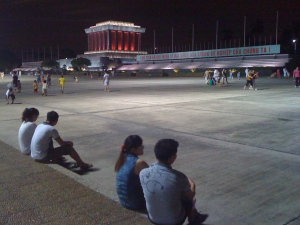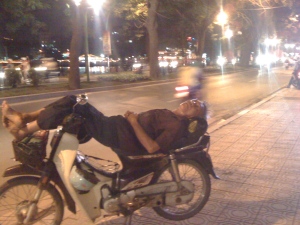So I’m back to trying to learn to drive. I hope people reading this from other locations don’t think driving a motorbike is actually that challenging. It’s really just that I’m mildly retarded when it comes to physical things (or regular things); that I’m a big fucking terrified baby; and that I don’t have a whole lot else going on in my life here to talk about, a life that is small and cozy and pretty darn good.
My first shot at driving was right when I got here. I’d been in Hanoi all of a week; it was 115 degrees; my life was in shambles/3 bags. And I’d still never ridden a bicycle. Given those circumstances I did pretty well. I met an OG expat who offered to give me lessons, one of those weathered old dudes you know has about a million stories hidden in the folds of their baggy clothing and leathered skin (such as, oh, hitchhiking from Paris to Katmandu in 1972).
After the first “lesson” I got demoted from motorbike to bicycle. We borrowed a bike from the neighboring fried fish stall and wheeled it over to the temple across the street, right on the lake—one of those little pockets of stillness in this big crazy city.
It got to be a thing, those first few weeks—meeting for coffee, going to the temple, Daniel clutching the seat and running behind me like I was five. I was equally into the lessons for the bits of stories that would leak out (“The ship docked in Cairo and my mother went out, hawked a ring to buy medicine for me”) as for the bike riding. I’d let the stories distract me from my fear as I tried to pedal on my own—wobbled and fell over as Daniel strolled pensively, snapping photos and smoking cigarettes and remarking, “Six meters!” when I finally started to get it.
There were a bunch of vendors at the temple, selling bottles of water and gum and candies, those little single packets of rice crackers, and they got to know us. They all thought I was Daniel’s daughter, he told me, which was funny cause I was a different race and about a foot taller. They were all quite liberal with the advice too, which they shouted out to me in Vietnamese as though I’d actually understand, in a way that I was beginning to understand as totally characteristically Vietnamese. It didn’t seem so different from the way the ladies at the Vietnamese nail salons in Oakland would bark at me when I’d walk in: “Ok, manicure, you pick a color!”
One lady in particular would get real into it, walk up to the handlebars and gesture and point and rattle on, then stop and smile at me, laugh a little.
“She’s right,” Daniel would say. “You need to look up.”
She was the lady who leapt up and applauded when I finally made it 20 meters by myself. I wobbled past and grinned.
“How old are most people in America when they learn to ride a bike?” Daniel asked later over coffee.
I shrugged. “Five or six.”
“And how old are you?”
“29.” I looked into my coffee, ashamed.
Daniel nodded, took a long drag. “So today you have grown 26 years.”
I smiled.
It was all going great, going just swimmingly, until the next lesson when he’d decided I was ready to go back on the motorbike. It was an especially hot day; I’d come over to his house and he was fighting with his girlfriend; we’d gone to a different temple and I’d fallen over about ten times, shaky from the heat and the frustration, my legs bashed by the foot pegs so many times they’d looked like bruised bananas the next day. I’d also gotten three jobs and a private student by that point, all scattered in a fucked-up hodge-podge of hours. I decided to go on motorbike-driving-learning hiatus until my schedule mellowed and the heat broke.
Which would be about now. I’ve got my regular dude I use—a whole crew of xe oms, actually, who all live on my peninsula, who were mean and yell-y and mad-dogging at first but who now smile and wave at me when we pass, in another way that has started to seem characteristically Vietnamese to me, like I had to earn it.
But not driving in Hanoi sucks. It’s expensive and you can’t fucking go anywhere and you’re reliant on your friends and you get stuck places and it gets even harder to motivate yourself to ever leave the air-conditioned comfort of your bedroom.
Daniel’s busy working as a personal tour guide for eccentric wealthy people, so I’ve nominated my roommate as my new teacher. He seems okay with the role, though I guess he doesn’t really have a choice. I rented an automatic bike—“retard-proof,” Jacob calls it—and for a week now we’ve gone out, toodling around the peninsula in the evenings or the afternoons.
Our peninsula is kinda a magical place, like a little village smack in the middle of Hanoi. It’s got those rural rhythms, the expectedness of things: the bun cha stall that’ll be smoking meat in the mornings; the boys that play football in the road in the afternoons; the evening drink stall; the woman who rolls her clothing and bra cart out at exactly four o’clock everyday. It’s got the village characters too—the homecoming king and queen, who are the proprietors of the cafe we go to, always smiling and graceful and classy; the fat babies; the deranged rooster who shits on the cafe tables; the zealous young woman always kneeling at her altar (“like Carrier’s mom”); the woman who boils her stinky herb tea in the alleyway cause it’s too stinky to boil in the house; the four old military men who march around, “their evening constitution,” with straight backs and high knees, wearing their old army-issued socks.My favorite person on the whole peninsula is the little water-brained dude. He’s really little, like under five feet and scrappy too. His facial features are a bit squished and his hair is stringy, bald on top cause I see him sitting there, on the bench or leaning on the railing, staring into the lake as he picks at his hair. It’s not so common to see mentally disabled people in this part of the world; they’re usually shamefully tucked away, out of sight, so I like seeing him. I also just like him; he’s got a good sweet vibe to him. We started smiling and waving to each other and when I come down the block I always kinda look for him, get bummed if he’s not sitting there.
We see all the characters as we toodle around, chatting and bullshitting, Jacob giving me pointers that my brain understands but my body can’t follow. Complicated stuff like, “Don’t put your foot down” or “Don’t yank the handlebars.” The neighbors here have also begun to chime in with advice and encouragement—one man making throttle motions, sliding his hands together in a way that indicates that at any moment, any moment he expects me to just soar off in competent confidence. Right, I think, smiling and looking away.
So the other day we were at it, putzing slowly, when we came around the bend and I saw my water-brained friend. He started waving to me. “He’s totally you’re homie,” Jacob remarked as we approached.
“Totally,” I said.
We inched up and my homie started to say something to me in his garbled Vietnamese.
Jacob nodded. “He’s right.”
“What?”
“He says you need to put your feet up.”
I turned to my homie, shrugged my hands in the air. He grinned and laughed.
“This is great,” I said to Jacob as we eased down the alleyway back towards our house. “Like, if you’re ever busy one day, I could just get my homie to give me lessons.”
We laughed, shook our heads at the bumbling ludicrousy of me as we rumbled past the trash bags and kitten cages, the pot of stinking tea boiling beside the gate.



















Recent Comments